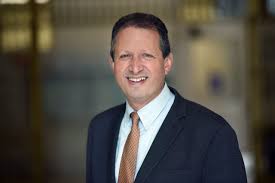New York, NY — Lindsay Dougherty, former recording-secretary for the Teamsters Hollywood Local, has a new role as the international union’s Motion Picture and Theatrical Trade Division director. The second generation Teamster will now be focused on national bargaining efforts and managing entertainment organizing in North America, as well as interfacing with Locals and tackling industrywide initiatives.

Dougherty was also recently elected an International Western Region vice president on the Teamsters General Executive Board with newly-elected President Sean O’Brien, who succeeded James P. Hoffa.
O’Brien has said unionizing Amazon workers will be a priority and wants to work more closely with other unions. LaborPress caught up with Dougherty to find out more about the new slate’s focus and how they plan on fulfilling their reformist campaign promises.
LP: With the new slate, will the Teamsters reform to democratize the union?
LD: Absolutely, yes. I mean, that was our campaign promise and that’s exactly what we’re going to do. And we’re starting to work now, but it’s gonna take some time to get there. But with our leadership under Sean O’Brien there’s no doubt that we’ll get there.
LP: What are some of the ways you think that can happen?
LD: Well, the divisions as they stand right now are being analyzed and restructured to make it better for all the locals and the joint councils. As you know, the locals have their own autonomy and the joint councils also depend on the international and so, that’s the goal right now. There’re new division directors that have been appointed by Sean O’Brien and [General Secretary-Treasurer] Fred Zuckerman at the moment. So, right now the focus is just getting those hitting the ground running. I think the biggest fight for the Teamsters is going to be the UPS division. It’s a package division, which UPS is under. So, that’s being restructured to just help, again, with the locals. Help contract enforcement and with negotiations since there’s a national agreement.
LP: What will be your approach to national bargaining and organizing?
LD: Well, for the motion picture division, I can speak specifically just because I’ve been newly appointed as the division director, and that’s the industry that I’m familiar with. That’s our Teamsters Local 399, it’s primarily only motion picture, we’re a craft local. So right now, we have various contracts that are being negotiated by each local union. There’s about 50 unions, or 50 locals that have motion picture [contracts] under the motion picture division. So, with a national contract, that’s always been a discussion in our industry because a lot of the local unions that negotiate these contracts don’t have a lot of motion picture industry. So, we have to have discussions with all the local unions about that. There’s been an area standards discussion as well, and there’s a lot to do because we have to look at all the agreements, talk to all the locals, but I think it would benefit the locals by having a national agreement because they’re not used to negotiating with major studios like Walt Disney Pictures, Apple. So, it will definitely help the leadership at each local union with the negotiating and also contract enforcement. And then for organizing, our industry is primarily organized in the sense that, you have the Teamsters, you have IBEW, IATSE — a lot of members about 60,000 nationally. Then there’re other local unions like SAG-AFTRA, DGA, WGA. So, for the Teamsters, there’s a lot of outside vendors that facilitate the industry. And that’s definitely a goal of ours, to target those companies that are helping the industry, but they’re not major studios. And then there’s also these classifications that are traditionally covered under our industry as Teamsters and not every local union has those classifications. That’s also going to be a focus.
LP: How do corporations profit off members’ labor and how will you fight that?
LD: Well, they’re always gonna profit off the labor right? But I think primarily for our members, that’s something that has been right now a big discussion because the corporations that we deal with are these companies that are producing content, specifically for streaming now because that’s new, the future of entertainment. So, streaming companies like Apple, for example, who we just recently negotiated, as well as Netflix for the first time, they’re under a term agreement. I think we most definitely have to make sure that we’re getting good contracts and that our members are being compensated for the work that they’re doing, especially if these corporations are each year projecting to make billions and billions of dollars. I think for our members, too, if a company isn’t offering them a good contract, that’s a hard pill to swallow if they’re not being compensated for the work that they’re doing.
LP: Where are the Teamsters in the campaign to organize Amazon?
LD: Well, there has been a division under the organizing division. There has been a director that was appointed by the previous administration still technically in office. So, I’m not involved in that as much as motion picture. I do know that it is definitely a focus of Sean O’Brien and Fred Zuckerman — especially since Amazon is competing with UPS ,which is the largest employer that the Teamsters have a contract with. So, there are a lot of discussions happening now. A lot of presentations, a lot of education. I think there’s gonna be restructuring of that division as well. But like I said, I’m not in it as much just because I’m in the motion picture world. I do know that it is definitely a focus and Sean O’Brien has talked a lot about that because it’s obviously important. Amazon’s just a goliath of a company that should have been organized decades ago.



